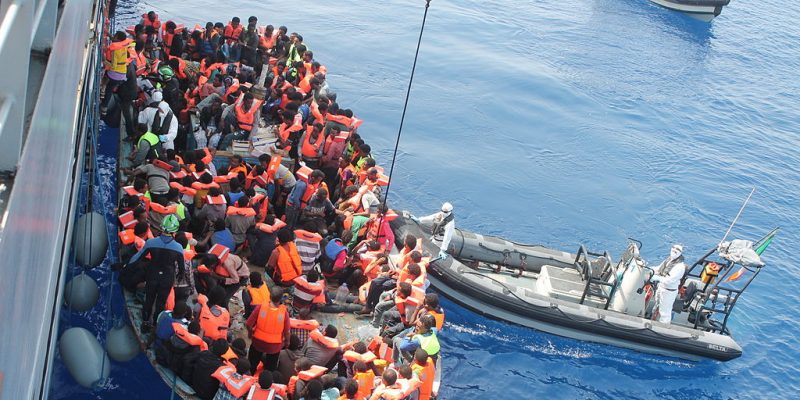1. Emergency & MOAS together to save lives in the Mediterranean sea
The central Mediterranean route, as already highlighted, is becoming more and more deadly. To try to stem this worrying phenomenon, NGOs Emergency and the Migrant Offshore Aid Station (MOAS) launched a joint rescue mission aiming to save lives on the most dangerous boundary in the world: our sea.
Repubblica and Vita narrate the important initiative of the two humanitarian organizations – which started only a few days ago and has already rescued hundreds of lives.
2. “If we don’t go, how many will die to sea?”
The MOAS and Emergency’s initiative is not the only one of this kind. Saving lives at sea is also the mission of Aquarius, the boat used by the NGO SOS Mediterranée. The beautiful reportage of Fanny Carrier for the AFP tells how it is life on board of a rescue boat saving hundreds of lives everyday.
3. There is a judge in Milan
You are poor? You have the right to be welcomed in Italy. An ordinance by the Court of Milan – quoting the Universal Declaration of Human Rights – granted to a twenty-four years-old man from Gambia a residency permit by virtue on grounds of humanitarian protection, which had previously been denied to him by the Territorial Commission. A revolutionary verdict which, for the first time, sets on equal footing economic migrants and refugees. La Stampa’s article,
4. The “masked evacuation” of the Baobab reception centre
Last summer, the Roman reception center for asylum seekers in transit known as “the Baobab” – entirely ran by volunteers (without any support from the local administration) – played a key role in guaranteeing a shelter for the hundreds and hundreds of refugees arriving in the capital. The center was evacuated in December 2015 but the activity of the autonomous organization – the Baobab Experience – kept going. With the increase of the arrivals during summer months, a new informal settlement rose up – but the structure was again partly evacuated by security forces on account of “decorum” necessities.
In other words? Welcome to Roma, capital of the non-reception! For an account of the facts, read the article by Claudia Torrisi for Fanpage and the one by Leonardo Bianchi for Vice News Italia.
5. Grassroots responses are not enough
What is happening to the Baobab raises once again the question of the inadequate answers provided by official institutions and authorities to the refugee crisis.
Why can’t Rome follow the examples of Milan and Paris, where centers hosting migrants in transit are ensured thanks to joint projects between the municipalities and NGOs? The article by Eleonora Camilli for Redattore Sociale asks the mayoral candidates Roberto Giachetti and Virginia Raggi to take a stand on the matter.
6. Refugee camps are no answer to a complex crisis
A few weeks ago the Kenyan government announced its decision to close the mega refugees camps of Dadaab and Kakuma. The international community expressed grave concerns for this announcement. But in fact the situation in Kenya is only the symptom of a bigger problem: refugee camps have represented for far too long the main answer of the international community to the humanitarian crisis – despite the fact they are in reality only temporary solutions.
The article for the Guardian of Marilena Hatoupis and Sonia Ben Ali (founders of Urban Refugees).
7. “We built this city by ourselves”
The Calais “jungle” is far more than a (unauthorized) refugees camp: it is a vibrant place full of energy, which has been built up by refugees themselves – with the aim of making it looking like a home. The camp buildings include cafes, restaurants, churches, mosques, but also books shop and a radio station.
Here is how refugees became the architects of Calais.
8. A familiar welcome for refugees
For the third episode of Welcome to Italy – a five-part reportage about the reception of migrants in Italy directed by Stefano Liberti for Internazionale – Annalisa Camilli and Mario Poeti narrates the story of Seny, a Gambian asylum-seeker who has been welcomed by an family from Asti.
Thanks to the Italian family Seny found a job as janitor in a sport center and began to rebuild his life – but today his future is uncertain because the Territorial Commission denied him the humanitarian protection and, if the refusal is confirmed, the young man will become an illegal migrant and lose his job.
9. “They smuggle us like drugs”
The bsence of legal way of access, the collapse of the asylum system and closing of the frontiers.
Europe is becoming a real fortress but this obviously does not stop refugees who are looking for safety in the Old Continent – and those who are taking advantage of this situation are smugglers, whose business is more prosperous than ever. The article by Quartz.
10. The unsolved gender gap
The travel towards Europe is particularly dangerous for women, who are particularly exposed to violences and oppressions of every sorts.
The “gender gap” inherent to the humanitarian crisis (of which we analyzed the specific Italian dimension) is once again taken into account by News Deeply – which already proposed a three-part reportage on the topic – with specific regard to the significant problem of pregnant asylum seekers.









